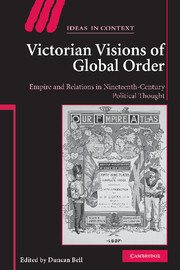 Victorian Visions of Global Order
Victorian Visions of Global Order Book contents
- Frontmatter
- Contents
- Contributors
- Chapter 1 Victorian visions of global order: an introduction
- Chapter 2 Free trade and global order: the rise and fall of a Victorian vision
- Chapter 3 The foundations of Victorian international law
- Chapter 4 Boundaries of Victorian international law
- Chapter 5 ‘A legislating empire’: Victorian political theorists, codes of law, and empire
- Chapter 6 The crisis of liberal imperialism
- Chapter 7 ‘Great’ versus ‘small’ nations: size and national greatness in Victorian political thought
- Chapter 8 The Victorian idea of a global state
- Chapter 9 Radicalism and the extra-European world: the case of Karl Marx
- Chapter 10 Radicalism, Gladstone, and the liberal critique of Disraelian ‘imperialism’
- Chapter 11 The ‘left’ and the critique of empire c. 1865–1900: three roots of humanitarian foreign policy
- Chapter 12 Consequentialist cosmopolitanism
- Index
- Ideas in Context
Chapter 4 - Boundaries of Victorian international law
Published online by Cambridge University Press: 22 September 2009
- Frontmatter
- Contents
- Contributors
- Chapter 1 Victorian visions of global order: an introduction
- Chapter 2 Free trade and global order: the rise and fall of a Victorian vision
- Chapter 3 The foundations of Victorian international law
- Chapter 4 Boundaries of Victorian international law
- Chapter 5 ‘A legislating empire’: Victorian political theorists, codes of law, and empire
- Chapter 6 The crisis of liberal imperialism
- Chapter 7 ‘Great’ versus ‘small’ nations: size and national greatness in Victorian political thought
- Chapter 8 The Victorian idea of a global state
- Chapter 9 Radicalism and the extra-European world: the case of Karl Marx
- Chapter 10 Radicalism, Gladstone, and the liberal critique of Disraelian ‘imperialism’
- Chapter 11 The ‘left’ and the critique of empire c. 1865–1900: three roots of humanitarian foreign policy
- Chapter 12 Consequentialist cosmopolitanism
- Index
- Ideas in Context
Summary
INTRODUCTION: THE NEW CENTRALITY OF THE SCOPE OF INTERNATIONAL LAW
When John Stuart Mill wrote in 1859 that ‘[t]o characterize any conduct whatever towards a barbarous people as a violation of the law of nations, only shows that he who so speaks has never considered the subject’, he ignored, whether unwittingly, or more probably wilfully, a long history of legal and diplomatic relations with many non-European powers and of sophisticated philosophical and doctrinal inquiries into the universality or limits of the law of nations. Mill's Victorian contemporaries almost universally concurred in his judgement that very few, if any, non-European states could be considered equal subjects of international law, but they debated the scope of international law and the grounds for its boundaries with an urgency that belies Mill's self-assured dismissal of the very question.
The question of the geographic scope of the law of nations was central for theorists of international law throughout the second half of the nineteenth century in a way that it had not been to the thinkers they recognised as the founders of their field – Grotius, Pufendorf, Wolff, or Vattel, for instance. In this chapter, I explore the preoccupation among Victorian thinkers, both international lawyers and participants in a broader public debate, with the question of the scope of international law and the extent to which it could be thought to apply to non-European societies, especially Asian commercial states.
- Type
- Chapter
- Information
- Victorian Visions of Global OrderEmpire and International Relations in Nineteenth-Century Political Thought, pp. 67 - 88Publisher: Cambridge University PressPrint publication year: 2007
- 14
- Cited by
